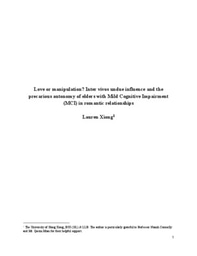Love or manipulation? Inter vivos undue influence and the precarious autonomy of elders with Mild Cognitive Impairment (MCI) in romantic relationships
Rising elderly marriage rates bring well-being benefits but also unique vulnerabilities.2 While severe cognitive decline is addressed by mental capacity law, this article focuses on elders with Mild Cognitive Impairment (MCI) – affecting over 21.2% of those aged over 65.3 MCI causes fluctuating judgment and memory issues, impairing complex decisions like finances, yet sufferers are legally presumed capable. Consequently, undue influence claims become the last defense against exploitation within romantic relationships, especially concerning inter vivos financial transactions.
This article argues that the current undue influence doctrine inadequately protects elders with MCI, failing to assess vulnerabilities arising from cognitive decline interacting with relational pressures. Rising marriage and litigation necessitate reform. This article proposes recognizing a specific "MCI-relationship vulnerability presumption" to better balance protection and autonomy for this group.

Please sign in
If you are a registered user on Laidlaw Scholars Network, please sign in